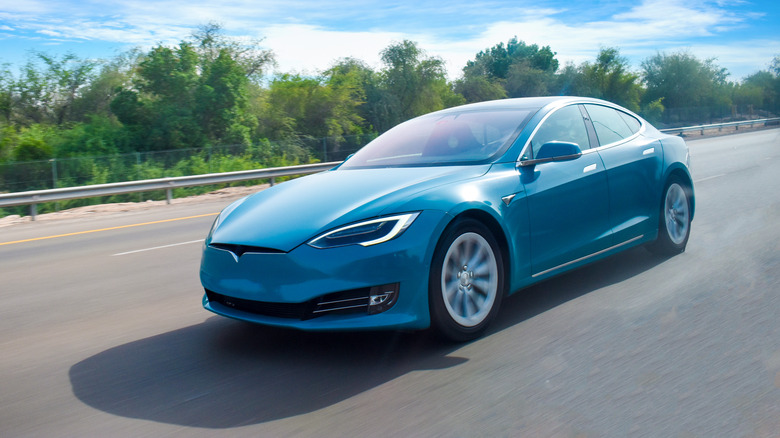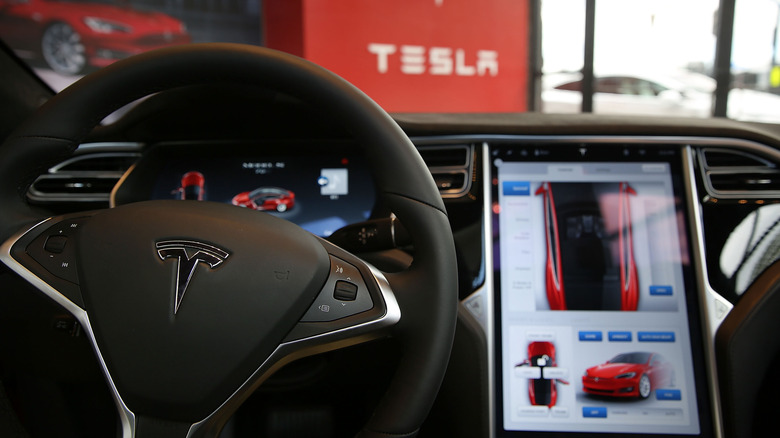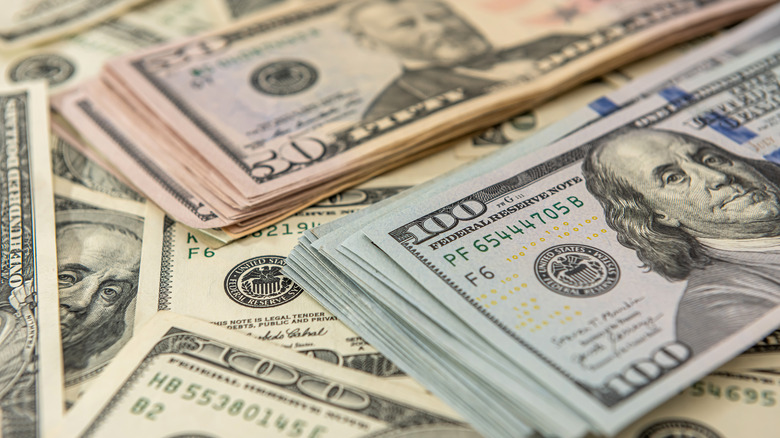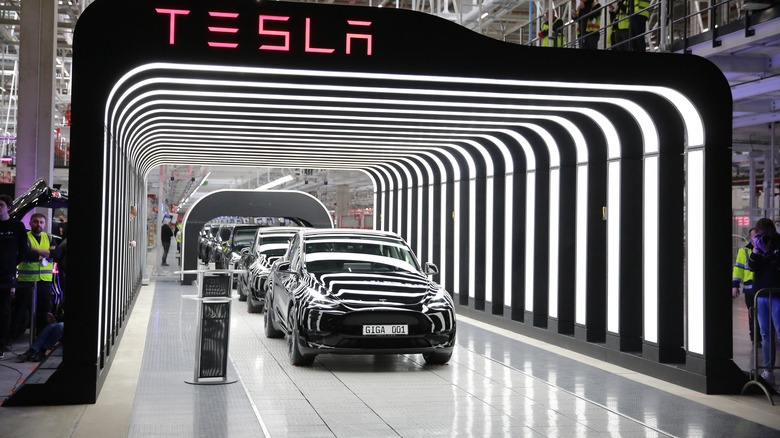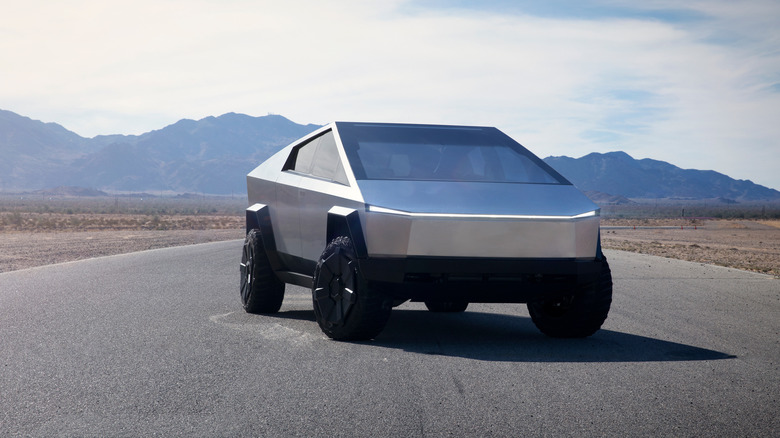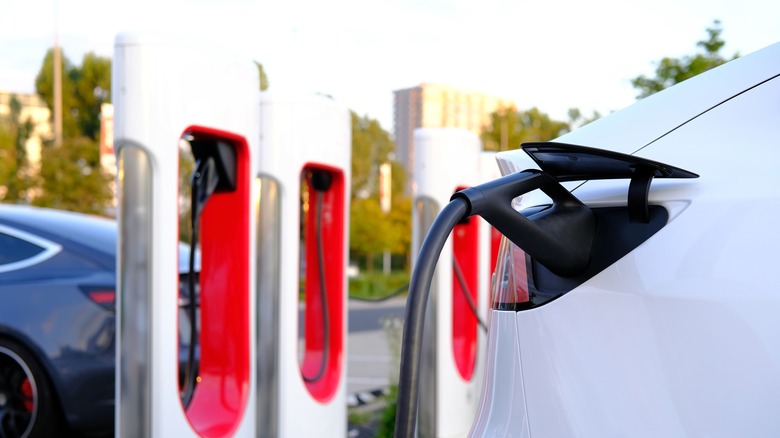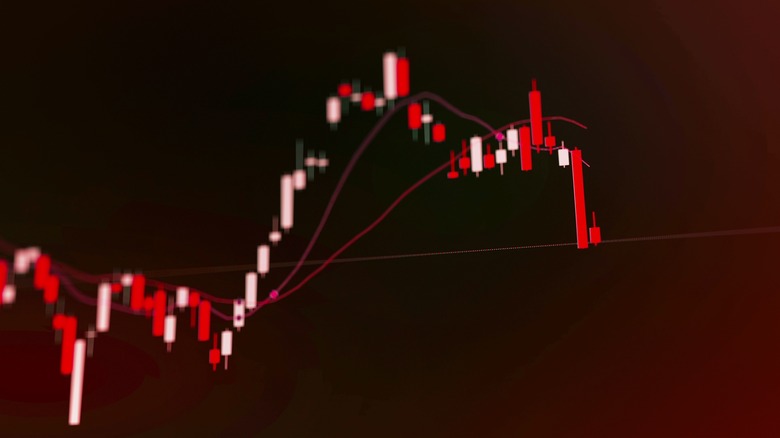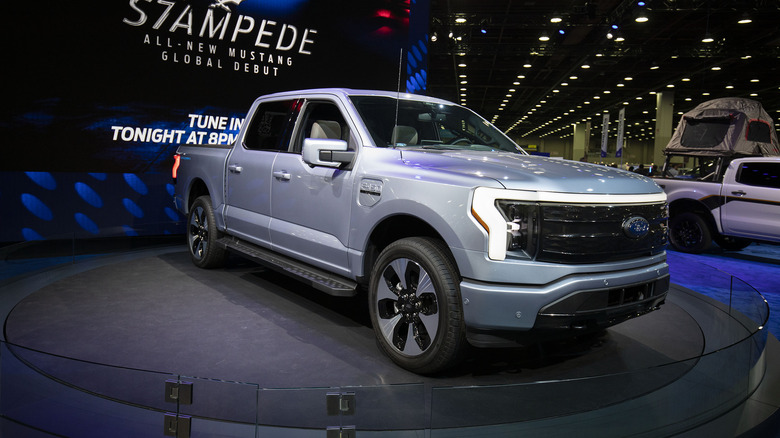10 Reasons Buying A Tesla Just Isn't Worth It
If you're looking to ditch fossil fuels and buy an electric vehicle, one manufacturer's name likely springs to mind. Tesla has led the way in the EV market for over a decade now and is many people's go-to when it comes to environmentally friendly personal transport. The company earned its spot at the top through a combination of cutting-edge tech, clever marketing, and the attention-grabbing antics of its eccentric CEO.
However, there are some things you should consider before buying a Tesla. There's the fact it may result in you getting injured, either in a minor way or quite badly. It could also kill you or someone else if certain campaigners are to be believed. Then there's the fact you might not get what you paid for. There are also other options on the market, some of which are cheaper, and others are arguably better than a Tesla. Here are a few reasons why a Tesla might not be worth its massive price tag.
Questions have been raised about Tesla's build quality
With a car as expensive as a Tesla, everything should be on point. Unfortunately, this isn't always the case with high-end electric vehicles. In his Model Y, a prominent YouTuber has pointed out several quality control problems. As the video shows, the windshield wiper protrudes in a weird way, the steering wheel squeaks when it's being adjusted, there are several cleanliness-based issues you wouldn't expect to see on a brand new high-end car, one of the trunk's plastic stoppers fell off, some upholstery came loose, and some of the exterior paint didn't match. These aren't major performance issues, but you don't expect simple quality control problems like this on a $60,000 car. Worse yet, there were some problems that prevented the car from functioning properly. One of the seat folding buttons was disconnected and did not work. The rear motor was incredibly loud at speeds above 40 mph. Fixing both of these issues requires a trip back to the dealership.
The Model 3 is also experiencing a number of quality issues. The entry-level model has issues with its paint — with some customers criticizing the finish. Others have reported the paint chipping or degrading faster than it should. Several points on the vehicle are prone to leaks, problems with the keyless entry system have seen customers locked out, and a touchscreen overheating issue led to a recall. A number of customers have also highlighted an issue with the vehicle's charging ports.
You could experience some customer service issues
While Tesla's are high-end products that use top-of-the-line technology, customer service problems can still arise. Despite the fact it's both a major selling point and exists to make life easier, that top-of-the-line tech can make getting help extremely difficult when things go wrong. A good example of this is what happened to Glenn Howerton, who is known for playing popular sociopath Dennis Reynolds in the hit FX show, "It's Always Sunny in Philadelphia." Howerton experienced a perfect storm of Tesla problems which resulted in his high-end EV getting stuck in an LA parking garage for over a day.
Keyless entry and Tesla's app, are both beneficial most of the time. You can unlock your car without rifling through your pockets. However, when Howerton's key fob broke he ran into a bit of an issue. The app wouldn't work as the garage didn't have WiFi, and Tesla wasn't keen to provide a solution. Howerton was left angrily denouncing Tesla due to the way they handled the incident, claiming he had been bounced between several departments, none of which were able to solve his problem. He was eventually able to unlock the car, but couldn't start it, and had to find a specialist tow truck due to the fact that towing a Tesla could destroy its motors. This proved an even greater issue as very few of those trucks could fit in the garage Howerton's vehicle was parked in.
You might miss out on a tax rebate
It's no secret that the government wants drivers to look towards more sustainable methods of transportation. Plenty of effort is being put into upgrading U.S. infrastructure to meet the growing demands of the EV market. The government also wants that market to grow even further, with the Biden administration setting several ambitious targets. If those targets are met, by the year 2030 half of all the vehicles sold in the U.S. will be electric.
To meet these targets, a number of incentives have been put in place. One effective incentive involves putting money back in the hands of people who have made an EV purchase. EV tax rebates have been around for many years, but many Tesla owners missed out due to the company hitting a cap on the number of eligible vehicles sold. The rules changed last year, which removed the cap on the number of vehicles sold and gave Tesla's cars a chance of qualifying again. However, a price cap of $55,000 for sedans and $80,000 for all other vehicles means many automobiles in Tesla's current range don't qualify for the rebate. This makes the cheaper options even cheaper. When buying a Model S or a Model X, you have no chance of getting the credit. Any optional extras will also send the Model 3 performance and Model Y long-range over the limit, meaning you'll pay a premium price while missing out on a generous incentive.
You'll be in for a wait
There are a number of reasons why you may not be able to just wander into a dealership and drive off in a brand-new Tesla. A global semiconductor shortage, coupled with various factors related to the coronavirus pandemic, made manufacturing electric vehicles a bit of a problem in recent years. As a result, customers were likely to spend months on a waiting list, and "used" Teslas were being sold — to people who couldn't be bothered to wait — for well over the vehicles' MSRP.
Things have gotten a little bit better over the last few months, and this was never really a Tesla issue. It's more of an industry-wide problem. However, you should probably hold off on buying a Tesla if there is a long wait involved. EV technology is improving at a rapid pace, so if you're sat waiting for a year or two there may be something better out when the car you ordered actually arrives. In Tesla's case, the company will be coming out with several cheaper, and more efficient, models in the near future. Hanging on for months, only to see something better come along at a lower price point may be frustrating. Even if the new vehicles are a long way off, you should still hold off until the prices stabilize.
Or you might not get it at all
Elon Musk is a man who enjoys a grand idea. He's spoken of colonizing Mars, building a hyperloop, and building intelligent robots that may end up taking on humanity's menial tasks. All three of these things have yet to become a reality, and it's a similar story with some of Musk and Tesla's more realistic projects. The Cybertruck was announced way back in 2019, and the initial idea of a "Tesla pickup truck" stretches back to 2012. Plenty of eager customers have had a small deposit in place for several years now. However, the vehicle has yet to enter production. As things stand, production is due to "start" this year, though mass production is unlikely to begin before 2024. Production of the vehicle has been knocked back several times already, and there's a chance it may be pushed back again. There are concerns over whether a completed Cybertruck will be street-legal, and recent sightings suggest its prototype may have some electrical issues that need working out.
If the Cybertruck does arrive, it won't be the vehicle customers initially laid a deposit on. The biggest change is related to the vehicle's size. The Cybertruck that will eventually ship is far smaller than the one Musk initially promised and even smaller than the already scaled-down prototype that was unveiled a few years ago. Wing mirrors and a large windscreen wiper are also present, despite not appearing on the concept vehicle.
It's losing a very exclusive selling point soon
A recent announcement is great news for the broader EV market, but bad news for Tesla owners that would like to be selfish with their perks. Teslas have long been able to access the company's "supercharging" network, a network of high-speed chargers designed for use on Tesla's vehicles, and capable of putting hundreds of miles worth of juice in a battery in mere minutes. In addition to how advanced it is, the supercharging network comes with another big bonus. Only Teslas can currently use it in most areas. That means when a Tesla owner pulls up to a Supercharging station, they aren't going to see an EV made by Nissan, Chevvy, Lucid, or anyone else queued in front of them. This is a major plus in places like California, where there simply aren't enough charging stations per EV owner.
However, things are set to change pretty soon. Tesla already allows non-Tesla EVs to access its charging network in places like the Netherlands, and it's planning to expand the concept to more areas soon. Eventually, all EV owners worldwide will be able to use Tesla's charging network, no matter the make of their vehicle. This is great news for most EV owners. Once they purchase an adapter, the number of charging stations they can access will increase significantly. But if you were planning on buying a Tesla to avoid competition at the charging station, it's probably worth reconsidering your vehicle choice.
Don't be influenced by outlandish promises
Elon Musk has a habit of being overly optimistic when discussing the potential of technology and what his companies may be capable of delivering in a very short timeframe. However, these predictions have fallen short so many times that you'd be forgiven for considering him the Peter Molyneux of the tech world. So far he's planned to launch an unmanned mission to Mars by 2022 with SpaceX, predicted AI would be the cause of a "seriously dangerous" event by the end of 2024 at the very latest, and promised the brain chips he can't get past the FDA would change everyone's lives.
But the overly optimistic — and potentially false — promises aren't just limited to SpaceX, OpenAI, and Neuralink. Tesla has also promised a lot and failed to deliver on a number of occasions. For example, a live audience saw not one but two of the Cybertruck's "bulletproof" windows fail when a steel ball was tossed at them. Musk also stretched the truth in 2016, when Tesla released a video demonstrating the vehicle's full self-driving capabilities. It later emerged the video was "staged," and Musk knew all about it.
The company could actually disappear
Tesla is one of the most valuable companies in the world. Many put their money where their mouth is and back it as they believe the EV market is set to grow, as the biggest name in that industry is probably the safest bet if you want to cash in. However, things may not be so secure. Motor vehicle companies are never that far from disaster. AMC, Pontiac, Saab, Oldsmobile, and Rover are just a few that have ceased to exist in recent years. Musk himself has commented on how savage the industry is, declaring that Tesla and Ford are the only two American car companies never to go bankrupt.
But Musk's tweet isn't exactly accurate. Henry Ford's first two motor companies went bust, and Ford's current incarnation almost went to the wall during the 2007 financial crisis. Tesla too has been on the verge of going bust on a number of occasions. Musk has also claimed that he wouldn't care if the company that accounts for most of his net worth goes bust, provided another company was making EVs of similar quality. Thing is, if the company went bust and no one stepped in to pick up the pieces, there's a chance no entity would be around to honor Tesla's warranties or update its software. So you'd have to live with any bugs that develop, and if your battery fails within the eight-year/100,000-mile window, you're stuck with a very expensive problem.
There are some very good alternatives
Tesla may be the biggest player in the market, but in 2023 they're far from the only game in town. Most major traditional vehicle manufacturers are developing their own electric vehicles, and there are many other EV-only companies too. If you want high-end luxury, Lucid has a direct challenger to the Model S Plaid. The Lucid Air Sapphire may actually be capable of outperforming the Model S Plaid in a number of key areas. If you're sick of waiting for the Cybertruck, Ford has an incredibly popular electric version of the F-150 that comes with its own strange but useful features.
Elon Musk's electric cars also come at a bit of a premium. If you want something entry-level, and need to save some pennies, a Chevy Bolt may be the ideal choice for you. The Bolt is over $15,000 cheaper than the Tesla Model 3, and the owner of Chevrolet hasn't caused any social media controversy in recent years. If an SUV takes your fancy, you're spoiled for choice. There are also battery-powered muscle cars, and sportier efforts are available if you want something flashy. You may still want a Tesla, but if you look past the hype, the alternatives may be better.
There might be some danger involved
Driving any car could lead to an injury, but Tesla's tech presents a few unique dangers to be aware of. The company has issued several "recalls" over software issues that have put customers in varying degrees of danger. Last year, over a million vehicles were affected by an issue that could have left occupants with a slightly sore limb. The electric windows didn't know when to stop and could potentially pinch a passenger's (or driver's) appendage. The problem was fixed with an over-the-air update, but that took a short while to roll out.
Another recall relates to something with far more serious consequences. The heavily hyped, and long-awaited, Full Self Driving feature hit the beta stage late last year. Just hours after Elon Musk announced the news, someone allegedly using the feature at the time was involved in an eight-car pileup that injured nine people. Tesla seems to have acknowledged some of the dangers the Full Self Driving feature is creating, as an over-the-air update was promised following several more accidents. The U.S. Department of Justice is also looking into the software, and some claims Elon Musk made relating to it, after it was linked to a number of crashes. Some campaigners claim the software puts drivers and pedestrians in danger, and are pushing to have it heavily regulated or banned. One group even spent millions on an eccentric Super Bowl commercial that highlights what it claims are the dangers the software presents.
